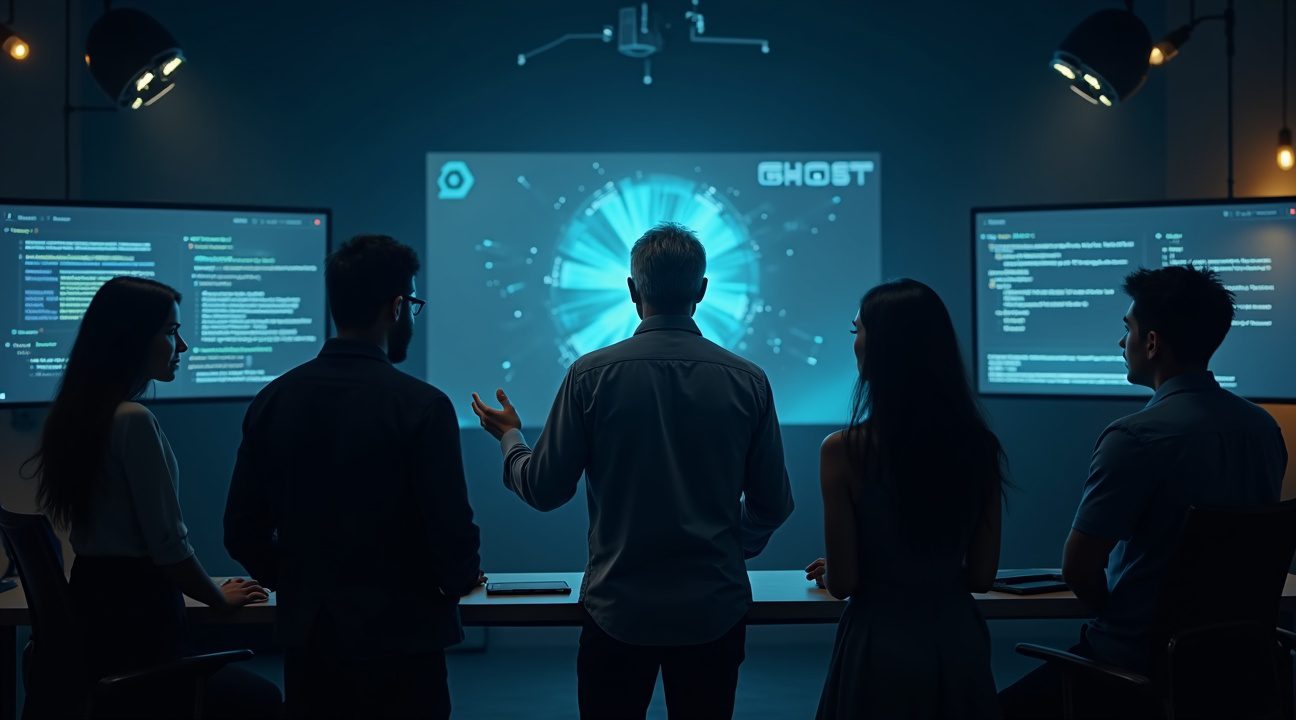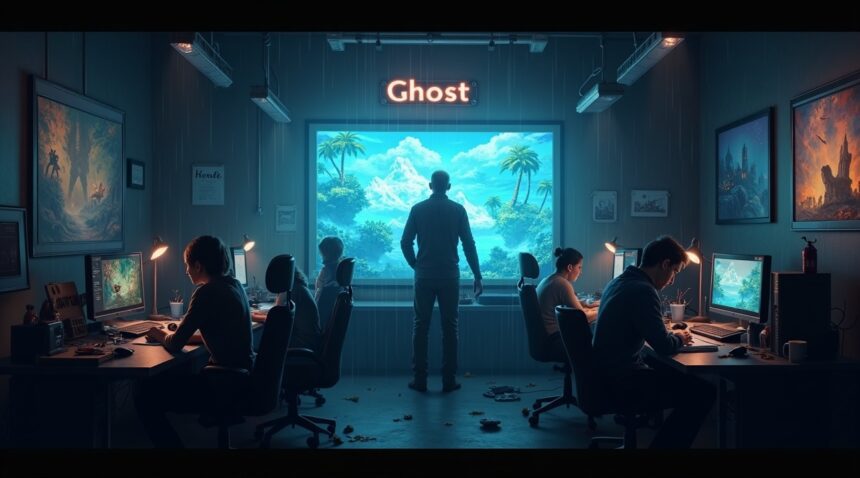NetEase Games has officially announced the closure of Fantastic Pixel Castle, a studio established by the renowned industry veteran Greg Street, best known for his impactful work on gaming giants such as World of Warcraft and League of Legends.
Studio Closure and Project Cancellation
Fantastic Pixel Castle, which focused on developing a fantasy MMO codenamed “Ghost,” will cease operations on November 17, 2025. The decision comes after NetEase withdrew funding from the project, signaling a significant shift in the company’s strategic direction. This move underscores NetEase’s broader retreat from investment in Western game development studios.
Key Takeaways
- Final Shutdown Date: The studio will officially shut down on November 17, 2025, ending its development of the ambitious MMO project referred to as “Ghost.”
- Part of a Wider Strategy: NetEase has closed multiple Western-based studios, including T-Minus Zero, Jar of Sparks, Worlds Untold, and Ouka Studio, reflecting a systemic withdrawal from international development ventures.
- Innovative Game Mechanics: “Ghost” aimed to revolutionize the genre with a dual-sphere gameplay system featuring private “Blue Shards” and more expansive multiplayer-oriented “Red Shards.”
- Loss of Industry Expertise: With the closure, the gaming industry loses a depth of MMO design experience. Greg Street played a key role in structuring systems for titles like World of Warcraft and assisted in the development of Riot Games’ MMO initiatives.
- Support for Affected Developers: Greg Street and his leadership team are committed to helping displaced staff through job placement efforts, while also seeking independent opportunities to revive the Ghost project despite major funding obstacles.
More About Greg Street’s Legacy
Greg Street’s impact on the MMO genre cannot be overstated. His contributions helped shape fundamental mechanics now considered standard in online multiplayer games. His vision for an open, collaborative gameplay environment lives on in the public details of “Ghost.”
For those interested in following developments or exploring a comprehensive summary of the closure, visit the full article on PC Gamer.
Greg Street’s Fantasy MMO Studio Faces November 17 Closure After NetEase Cuts Funding
NetEase Games has delivered devastating news to the gaming industry, announcing the closure of Fantastic Pixel Castle (FPC), the ambitious MMO studio helmed by industry veteran Greg Street. The studio will permanently shut down on November 17, 2025, marking the end of a promising project that attracted significant attention from MMO enthusiasts worldwide.
The closure stems directly from NetEase’s decision to withdraw funding and first-party support for FPC’s unnamed MMO project, often referred to as “Ghost” in development circles. This move effectively terminated the studio’s ability to continue operations, leaving Street and his team without the resources necessary to complete their vision for a next-generation massively multiplayer online game.
Street, who previously served as lead systems designer for World of Warcraft and later worked on League of Legends at Riot Games, founded FPC with considerable fanfare from the gaming community. His reputation for innovative game design and deep understanding of player engagement made the studio’s project highly anticipated among MMO fans seeking fresh experiences in a genre dominated by established titles.
NetEase’s Broader Retreat from International Investments
The FPC closure represents part of a larger strategic shift within NetEase’s international operations. The Chinese gaming giant has systematically scaled back its Western investments over the past year, closing multiple studios and divesting from various international projects. This pattern suggests a fundamental change in how NetEase approaches global expansion, moving away from direct studio ownership toward more conservative partnership models.
Several factors likely influenced NetEase’s decision to cut funding for FPC:
- Rising development costs for AAA MMO projects, which often exceed $100 million
- Increasing competition in the MMO market from established franchises
- Economic pressures affecting the broader gaming industry
- Strategic refocus on domestic Chinese market opportunities
- Challenges in managing remote international studio operations
The timing of the announcement leaves FPC staff with limited options for continuing their work elsewhere. November 2025 gives the team several months to seek alternative employment or potentially find new funding sources, though the latter option appears unlikely given the specialized nature of their project and the significant investment required to complete an MMO.
Street’s departure from the MMO development scene represents a significant loss for the industry. His previous contributions to World of Warcraft‘s endgame systems and his innovative approach to player progression systems had generated considerable excitement about what FPC might achieve. The studio’s closure eliminates what many considered a promising alternative to existing MMO offerings, potentially leaving players with fewer innovative options in an already limited market.
The shutdown also raises questions about the viability of independent MMO development in an era where major publishers increasingly prioritize lower-risk projects with faster returns on investment.
From World of Warcraft to League of Legends: The Veteran Behind the Shuttered Studio
Greg Street’s career trajectory reads like a roadmap through the most influential MMO projects of the past two decades. His journey from Blizzard Entertainment to Riot Games culminated in the creation of Fantastic Pixel Castle, a studio that represented NetEase’s ambitious vision for Western AAA game development.
Street established his reputation as lead systems designer on World of Warcraft, where he helped shape the foundational mechanics that kept millions of players engaged for years. His expertise in creating compelling progression systems and balancing complex gameplay elements made him a sought-after talent in the industry. This background proved invaluable when he transitioned to Riot Games, where he took on the role of executive producer for their highly anticipated League of Legends MMO project.
Building a Global Remote Studio
When Street departed Riot Games in 2023, he didn’t retreat from the MMO space. Instead, he founded Fantastic Pixel Castle as part of NetEase’s strategic expansion into Western markets. The studio operated with a fully remote structure, breaking traditional geographical barriers that often limit talent acquisition. This approach allowed Street to recruit experienced MMO developers from across the globe, drawing from the same talent pools that had contributed to World of Warcraft’s success and League of Legends’ enduring popularity.
NetEase’s investment in Fantastic Pixel Castle reflected the company’s recognition of Street’s proven track record. His decades of experience spanning both traditional subscription-based MMOs and modern free-to-play titles positioned him uniquely to bridge different design philosophies. The remote operation model also aligned with post-pandemic industry trends, offering flexibility that many developers had come to expect.
The studio’s formation represented more than just another development house. Street brought institutional knowledge from two of gaming’s most successful franchises, understanding both the technical challenges of creating persistent virtual spaces and the community management aspects that sustain long-term player engagement. His background encompassed the evolution from World of Warcraft’s subscription model through League of Legends’ innovative approach to competitive online gaming.
Street’s vision for Fantastic Pixel Castle emphasized leveraging his comprehensive understanding of player psychology and system design. Having witnessed firsthand how both Blizzard and Riot Games approached MMO development, he possessed insights into what worked across different player demographics and gaming cultures. This experience base made him an attractive partner for NetEase’s Western expansion strategy, even as the studio’s brief existence ultimately couldn’t overcome the challenging market conditions facing new MMO development.

The Ambitious Ghost Project That Never Materialized
Fantastic Pixel Castle’s flagship project represented an ambitious attempt to reimagine the MMORPG genre. The fantasy MMORPG codenamed Ghost aimed to capture AAA production values while addressing long-standing issues that have plagued traditional online games.
Ghost featured an innovative world called the Shardlands, designed specifically to avoid tired fantasy conventions. The game’s most distinctive feature involved its dual-realm system that promised to revolutionize how players experience online content. Players could seamlessly transition between Blue Shards, which offered private gameplay experiences, and Red Shards, functioning as traditional massively multiplayer servers. This approach would have allowed players to enjoy both intimate storytelling moments and large-scale social interactions within the same game world.
Revolutionary Design Philosophy
The development team crafted several groundbreaking systems that addressed common MMO pain points. Chapter-based narratives would have provided structured story progression, ensuring players always had meaningful content to pursue. Unique character classes were planned to offer distinct gameplay experiences rather than minor variations on existing archetypes.
Perhaps most importantly, Ghost included cooperative systems that eliminated level-based barriers between friends. Players at different progression stages could meaningfully play together without anyone feeling left behind or overpowered. These features demonstrated Greg Street’s deep understanding of what frustrates modern MMO players.
Fantastic Pixel Castle committed to extensive community involvement throughout development. The studio planned regular feedback channels and playable demos to ensure the final product matched player expectations. This approach reflected lessons learned from previous MMO launches where developers discovered critical issues too late in the development cycle.
The studio successfully created a playable demo that showcased core gameplay mechanics and the unique Shardlands setting. This demonstration piece helped attract potential investors who recognized the project’s innovative approach to solving traditional MMO problems. Despite generating genuine interest from multiple funding sources, Ghost couldn’t secure the substantial investment required for AAA development following NetEase‘s departure.
The failure to fund Ghost represents a significant loss for the MMO community. Few studios possessed the combination of industry expertise, innovative vision, and player-focused design philosophy that Fantastic Pixel Castle brought to the project. Street’s reputation for understanding player psychology and game balance could have produced something genuinely transformative for the genre.
Ghost‘s cancellation highlights the challenging economics facing ambitious game development projects. Even with proven leadership, innovative concepts, and working prototypes, securing adequate funding remains difficult in today’s competitive gaming landscape. The project’s demise leaves many wondering what might have been if different financial circumstances had allowed this creative vision to reach completion.
NetEase’s Western Studio Exodus: A Pattern of International Retreats
I’ve witnessed a striking pattern emerge from NetEase’s international operations that extends far beyond the closure of First Party Combat and Greg Street’s departure. The Chinese gaming giant has systematically shuttered multiple Western studios throughout late 2024, revealing what appears to be a comprehensive retreat from international development investments.
The casualties extend across multiple continents and include some of the industry’s most promising talent. T-Minus Zero in Austin, Texas, led by veteran developer Rich Vogel, fell victim to the strategic shift. Jar of Sparks in Seattle, under the guidance of Jerry Hook, also received closure notices. Worlds Untold in Vancouver, helmed by Mac Walters, couldn’t escape the widespread cuts. Even NetEase’s Tokyo-based Ouka Studio faced the same fate, demonstrating that the company’s pullback wasn’t limited to North American operations.
What makes these closures particularly striking is their timing and lack of completed projects. None of these studios managed to bring a single game to market before NetEase pulled the plug. The investment in high-profile industry veterans like Street, Vogel, Hook, and Walters represented significant financial commitments, yet the company abandoned these projects before seeing any return on investment.
Official Explanations vs. Industry Reality
NetEase has maintained that these closures stem from changes in global business strategy and resource allocation priorities. Company representatives have explicitly denied conducting a broad withdrawal from international markets, framing the decisions as strategic adjustments rather than a wholesale retreat. However, independent industry reporting paints a different picture, suggesting NetEase is significantly scaling back its non-China studio operations.
The disconnect between official statements and observable actions raises questions about the company’s true intentions. When I examine the pattern of closures, the evidence points to a systematic dismantling of Western development infrastructure that NetEase had spent years building. The company’s decision to simultaneously close multiple studios across different regions and genres suggests coordination rather than isolated strategic adjustments.
Financial pressures within China’s gaming industry have intensified over recent years, with regulatory changes and market saturation affecting major publishers. NetEase’s international expansion occurred during a period of rapid growth, but changing market conditions may have forced a reassessment of overseas investments. The company’s focus appears to be shifting back to domestic operations where they maintain stronger market positions and regulatory familiarity.
The closure timeline reveals careful planning rather than hasty decisions. Each studio received notice within weeks of each other, indicating NetEase had been evaluating its international portfolio comprehensively. The company’s willingness to absorb the financial losses associated with incomplete projects suggests external pressures outweighed potential future revenues from these Western ventures.
Industry analysts have noted that NetEase’s retreat mirrors similar moves by other Chinese gaming companies facing increased scrutiny both domestically and internationally. The geopolitical climate has created additional challenges for Chinese companies operating in Western markets, potentially influencing strategic decisions about international investments.
The human cost of these closures extends beyond the high-profile leadership figures to hundreds of developers who joined these studios expecting long-term projects. The gaming industry’s talent pool has been significantly disrupted, with experienced developers suddenly seeking new opportunities in an already competitive market. The timing of these announcements, coming during traditionally slower hiring periods, has compounded the challenges facing displaced workers.
NetEase’s pattern of international retreats represents more than simple business restructuring. The company’s actions suggest a fundamental reassessment of global expansion strategies that prioritized quick market entry over sustainable long-term development. The failure to produce any completed games from these substantial investments raises questions about the company’s approach to Western studio management and creative oversight.
Fighting for Developer Futures Amid Industry Uncertainty
Greg Street and the leadership team at Fantastic Pixel Castle didn’t simply accept defeat when NetEase announced the studio’s closure. Instead, they immediately shifted focus to protecting their team members’ careers during an increasingly volatile period for game development professionals. Street, drawing from his extensive experience at Riot Games and Blizzard Entertainment, understood that talented developers shouldn’t suffer because of corporate decisions beyond their control.
Developer Support Initiatives Take Priority
The studio’s leadership implemented comprehensive employment assistance programs to help affected staff transition successfully. Street personally leveraged his industry connections to create opportunities for team members, reaching out to contacts across major publishers and independent studios. This approach demonstrated how experienced leaders can use their networks to cushion the impact of game development layoffs on individual careers.
Several team members received direct referrals to positions at established companies, while others explored opportunities to form “Fantastic Pixel Castle 2.0” as an independent development group. This potential reformation represents a common industry response where talented teams attempt to continue their collaborative work under new organizational structures. The success of such ventures typically depends on:
- Securing adequate funding
- Maintaining core team cohesion
- Establishing efficient operational workflows
Ghost Project’s Uncertain Revival Prospects
Despite the official closure, a narrow possibility exists for the Ghost project to continue development if alternative funding sources can be identified. Street and his team have explored various options, including:
- Potential partnerships with other publishers
- Transitioning to an independent crowdfunding model
However, these revival efforts face significant challenges related to staff retention after the official closure date.
Many developers can’t afford to wait indefinitely for uncertain prospects, forcing them to accept other positions or pursue different career paths. Each departing team member reduces the likelihood of successfully reviving the Ghost project with its original vision intact. The entertainment software industry has seen similar situations where promising projects remained dormant for years before eventually being reimagined by different teams.
The situation at Fantastic Pixel Castle reflects broader challenges facing mid-tier development studios in today’s market. Publishers increasingly prioritize established franchises over experimental projects, creating difficult conditions for teams working on innovative concepts. Street’s leadership during this transition period exemplifies how industry veterans can help protect their colleagues while maintaining hope for future creative endeavors.

What This Means for the Future of MMO Development
Industry Consolidation and Risk Aversion
The closure of Greg Street’s studio represents a significant moment in the current gaming landscape, where major publishers increasingly favor proven formulas over experimental ventures. I’ve observed how the MMO space has become particularly challenging for new entries, with companies like NetEase pulling back from ambitious Western projects that require substantial long-term investment. This trend signals a broader consolidation within the industry, where publishers concentrate resources on established franchises rather than developing risky new intellectual properties.
NetEase’s decision to shutter the studio reflects the harsh economic realities facing MMO development today. The genre demands massive upfront investment, years of development time, and sustained post-launch support to compete with established titans like World of Warcraft and Final Fantasy XIV. When veteran talent like Street’s team can’t secure the backing needed for their vision, it creates a concerning precedent for future MMO innovation.
The Talent Drain Challenge
Street’s departure from the MMO development scene represents more than just one studio closing — it symbolizes the industry’s struggle to retain experienced developers who understand the unique complexities of massively multiplayer game design. The loss of such expertise creates a knowledge gap that’s difficult to fill, particularly when veteran developers move away from MMO projects after facing repeated setbacks.
This talent retention crisis affects the entire genre’s future potential. Consider these key implications for MMO development:
- Fewer experienced teams capable of handling large-scale multiplayer architecture and community management
- Reduced innovation as risk-averse publishers stick to established formulas rather than supporting experimental projects
- Longer development cycles as new teams must rebuild institutional knowledge about MMO design
- Increased pressure on remaining studios to deliver immediate returns rather than invest in long-term player engagement
The industry faces a critical juncture where the very people who built the foundations of modern MMO gaming are stepping away from active development. Street’s transition away from hands-on MMO creation, combined with similar moves by other veteran designers, suggests the genre may struggle to evolve beyond its current limitations.
Companies now find themselves caught between the enormous costs of MMO development and the uncertain returns in an overcrowded market. The success stories like Lost Ark or Guild Wars 2 seem increasingly rare compared to the numerous projects that never reach launch or fail to find sustainable audiences. This environment makes it extremely difficult for publishers to justify the investments needed for groundbreaking MMO experiences.
The consolidation trend extends beyond individual studio closures to affect entire regional strategies. NetEase’s retreat from Western development initiatives suggests that even companies with substantial resources are reconsidering their global expansion plans when faced with the challenges of cross-cultural game development and market penetration.
Moving forward, the MMO genre may see fewer ambitious new projects and more focus on maintaining existing successful games through expansions and updates. This shift could stifle innovation and leave players with limited options for fresh experiences in the massively multiplayer space. The industry needs to find sustainable models that can support the long development cycles and ongoing operational costs that MMOs require while still encouraging creative risk-taking from experienced development teams.
For more insights on Greg Street’s thoughts and perspectives, you can explore his interviews and recent talks available on gaming news platforms such as Polygon or GamesIndustry.biz.
https://www.youtube.com/watch?v=SJY5FIz3XMg

Sources:
NotebookCheck: “Fantastic Pixel Castle closure confirmed as NetEase ends support for ghost MMO ahead of November 17 shutdown”
Game Informer: “Fantastic Pixel Castle, A Studio Helmed By Former World Of Warcraft Lead, Faces Closure This Month After NetEase Split”
PC Gamer: “The MMO being led by former WoW designer Greg Street looks to be dead as his studio officially closes after NetEase ends funding”
Video Games Chronicle (VGC): “Another NetEase Games studio is shutting down”
VGChartz: “NetEase Games Shuts Down Fantastic Pixel Castle – News”
Gamespot: “NetEase Shutters MMO Studio Led By Former WoW Veteran After Two Years”
Massively OP: “Greg Street now says Project Ghost studio Fantastic Pixel Castle will close November 17”
Official Fantastic Pixel Castle website
NetEase Games press release


